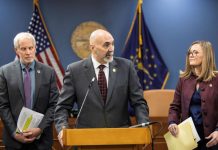Indiana Loses Another Abortion Case In Federal Court
By Brynna Sentel
TheStatehouseFile.com
INDIANAPOLIS—A federal appellate court has struck down another Indiana law aimed at making it more difficult for women to get an abortion.
The 7th U.S. Circuit Court of Appeals said Wednesday that the Indiana law requiring women to get an ultrasound 18 hours before an abortion created an undue burden and is unconstitutional.
The Indiana law, which was adopted in the 2016 legislative session, had made it difficult for women in rural areas or women who are low income to get the care they need. The ruling by the three-judge appellate panel upheld an injunction issued by U.S. District Judge Tanya Walton Pratt of the Southern District of Indiana.
Of 16 Planned Parenthood clinics in Indiana, only four perform abortions and have the ultrasound equipment at the same place.
“The effect of this law by requiring this ultrasound to be also 18 hours before the abortion was to force Planned Parenthood to either try and get ultrasounds in all its health centers, which we simply can’t because of cost or to require women now to make potentially two very lengthy trips, first to get the ultrasound and then to get the abortion,†said Ken Falk, legal director of the American Civil Liberties Union of Indiana in a press conference Thursday. The ACLU had sued on behalf of Planned Parenthood of Indiana and Kentucky.
Christie Gillespie, president, and CEO of PPINK, said there is no medical or legal reason for a patient to get an ultrasound 18 hours before the procedure.
“I join Ken in hoping that our legislature would choose to focus its efforts on real ways that abortions can be reduced if that is indeed their interest,†Gillespie said. Laws that fund comprehensive sex education and ensure that affordable birth control is accessible will reduce the abortion rate, she added.
The 7th Circuit, in the 51-page opinion upholding Pratt’s original injunction, wrote, “The district court found that the burdens were significant: additional travel expenses, childcare costs, loss of entire days’ wages, the risk of losing jobs, and potential danger from an abusive partner.â€
Falk said he hopes someone in the legislature will decide that passing laws that go back in time and try to take away women’s rights isn’t the best use of Indiana’s time and money.
“This is a routine that we go through in Indiana apparently, the legislature passes laws to try and impinge upon a woman’s fundamental rights frequently passing laws that seem to be clearly unconstitutional, we file a lawsuit, mend the lawsuit, and then the legislature does something else,†he said.
Jane Henegar, executive director of the ACLU of Indiana, said it demeaning to women to interfere with their constitutional rights and to endanger their health.
“Today’s ruling affirms that deeply personal decisions about abortion should be made by women in consultation with their doctors, not politicians pursuing an extreme ideological agenda,†Henegar said.
The 7th Circuit opinion affirming the injunction said that it is best to use rhetoric, not barriers to persuade women not to get abortions.
“Women, like all humans, are intelligent creatures with the ability to reason, consider, ponder, and challenge their own ideas and those of others,†the opinion said.
Attorney General Curtis Hill, who represented the state in the case, said he is disappointed by the decision and is considering his options. Hill is under pressure from the state’s Republican leaders to resign amid allegations he groped four women at an Indianapolis bar in March.
Falk said the state needs to consider the impact of its actions on the people who are affected,
“We are talking about real human beings,†he said. “We are talking about real human beings who are not able to obtain abortions, real human beings who are put at risk because of what the state of Indiana has done.â€
The 7th Circuit ruling is the second loss for the state this summer in an abortion case. In June, a federal judge struck down a new law which required doctors to report abortion complications to the state. The judge said the law, which was supposed to take effect July 1, was too vague.
The state’s Legislative Services Agency, in its report on that bill, noted that past efforts to enact abortion restrictions have been successfully challenged by ACLU of Indiana, resulting in the state paying about $290,000 in legal fees to the plaintiffs and their lawyers.
FOOTNOTE: Brynna Sentel is a reporter for TheStatehouseFile.com, a news website powered by Franklin College journalism students.





